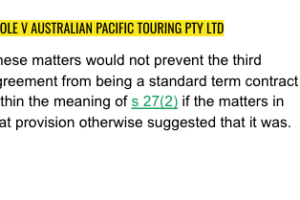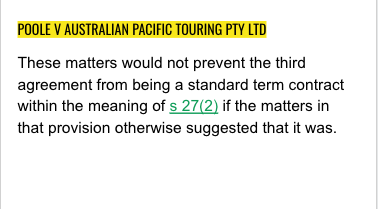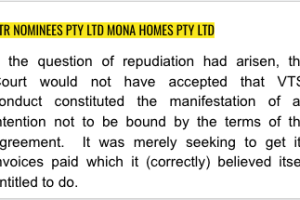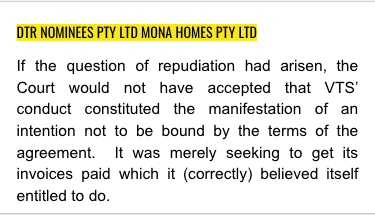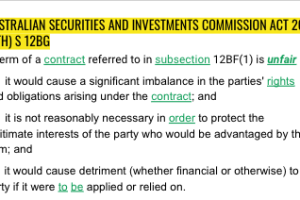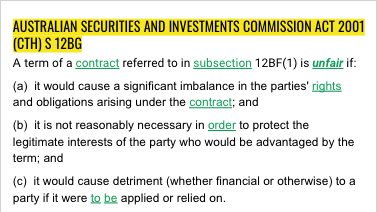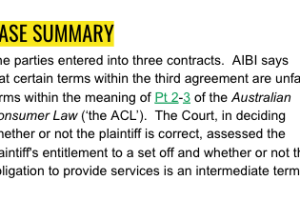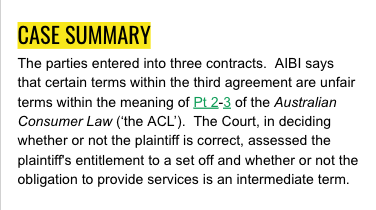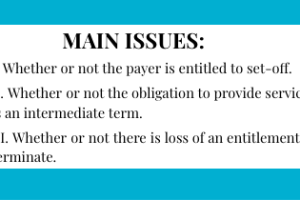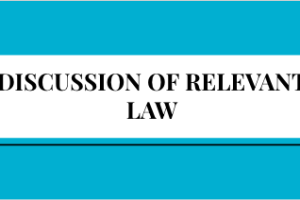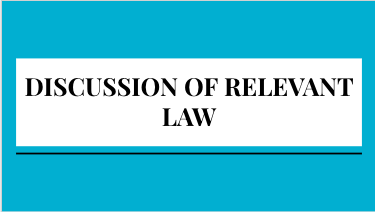Plaintiff Disputes Contract for Unfair Terms

AIBI Holdings Pty Ltd v Virtual Technology Services Pty Ltd [2022] FCA 696 (16 June 2022)

The parties entered into three contracts. AIBI says that certain terms within the third agreement are unfair terms within the meaning of Pt 2-3 of the Australian Consumer Law (‘the ACL’). The Court, in deciding whether or not the plaintiff is correct, assessed the plaintiff's entitlement to a set off and whether or not the obligation to provide services is an intermediate term.

Facts:
VTS and AIBI entered into three contracts: the 2016 contract (‘the first agreement’), the 2017 contract (‘the second agreement’), and the current contract which was executed on 20 February 2020 but backdated to 1 October 2019 (‘the third agreement’). Each of the agreements took the form of a standard set of boilerplate terms and conditions attached to two front pages which set out some particular terms, as well as the fee structure and the duration of the agreement. There was also a schedule to each agreement which identified the services which were to be provided by VTS. AIBI says that certain terms within the third agreement are unfair terms within the meaning of Pt 2-3 of the Australian Consumer Law (‘the ACL’), being Sch 2 to the Competition and Consumer Act 2010 (Cth) (‘the unfair terms case’).
Ms Laura Mao, one of AIBI's owners and its general manager, explained that in 2016, AIBI had desired to have an IT company take over its IT services and provide support. She was introduced to a Mr Glenn Kennedy who is the founder of VTS and its Chief Executive Officer. A meeting between Ms Mao and Mr Kennedy took place sometime in July 2016 where Mr Kennedy suggested that any contract would be of a three year term. Ms Mao said that negotiations about the first agreement did take place.
In her affidavit evidence, Ms Mao nominated two of AIBI’s employees as being the persons who on behalf of AIBI conducted the negotiations: Mr Fabio Gallego, AIBI’s operations manager, and another person called Lincoln. Lincoln negotiated the technical aspects whereas Mr Gallego was to negotiate the prices and the technical issues. Mr Gallego’s evidence was that he was brought into the negotiations at the end of the negotiation process.
His role was to provide technical input and details for VTS so that it could come up with a price. Eventually a price was worked out between Mr Kennedy and Mr Gallego. Mr Gallego took this price to Ms Mao and she gave her approval. Ms Mao’s evidence was that she did not seek legal advice about the contract at that time because she felt that she could trust VTS. On 25 July 2016, Mr Gallego signed the first agreement relating to the provision and support of 70 managed desktops and 2 managed servers.
Even though the first agreement did not have a specified term, the parties entered into a fresh agreement in October 2017 which was expressed to be for a five year period. It was signed this time by Ms Mao. It was subject to the same terms and conditions as the first agreement and contained the same description of the services. However, it now covered 2 managed servers, 118 managed desktops and 47 Chromebooks. AIBI argues that the express terms of cl 11.10 entitled AIBI not to pay the disputed amounts if the dispute resolution mechanism in cl 18 had been activated.

Issues:
I. Whether or not the payer is entitled to set-off.
II. Whether or not the obligation to provide services is an intermediate term.

Applicable law:
(a) it would cause a significant imbalance in the parties' rights and obligations arising under the contract; and
(b) it is not reasonably necessary in order to protect the legitimate interests of the party who would be advantaged by the term; and(c) it would cause detriment (whether financial or otherwise) to a party if it were to be applied or relied on.



Analysis:
As to the question of set-off, there are two variants of this argument. The first is that the express terms of cl 11.10 entitled AIBI not to pay the disputed amounts if the dispute resolution mechanism in cl 18 had been activated. Since it was not activated, it followed that the face value of each invoice was payable in full. The second variant of the argument involves the proposition that debts due to AIBI by VTS could be set off against debts owed by VTS to AIBI.
AIBI did not allege a case that VTS was estopped from relying upon cl 11.10 in relation to the Chromebook charges, although such a case may be readily enough be imagined. Had it been put, questions of detrimental reliance would have become relevant. None of AIBI’s witnesses were cross-examined about what AIBI would have done if VTS had not represented to it in May 2020 that the Chromebook charges were not due. VTS did not act in breach of the third agreement by withholding its helpdesk services during the lockdown.
The obligation that VTS had to provide its services was an intermediate term. Depending on how serious the withdrawal of services was, it might justify AIBI in terminating the third agreement. The breach by VTS has long been remedied since the helpdesk services were restored on 25 August 2020. Since the breach has been long cured, no continuing right to terminate remains extant. Even if it were extant, by failing, even now, to terminate the third agreement, AIBI has waived the breach.
Conclusion:
The application is dismissed. The parties are to file and serve any affidavits relating to the question of costs within 7 days. The parties are to file any written submissions on the question of costs within a further 7 days. The question of costs is to be resolved on the papers.

